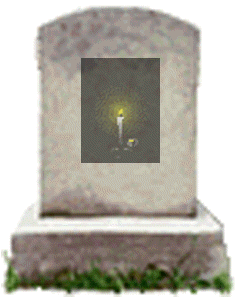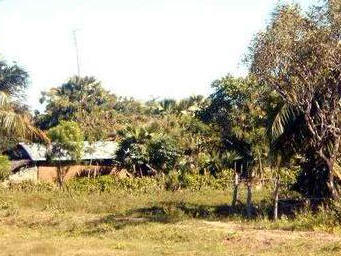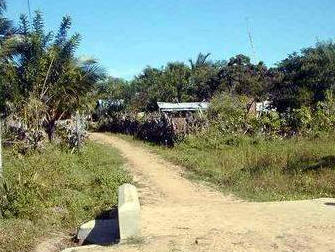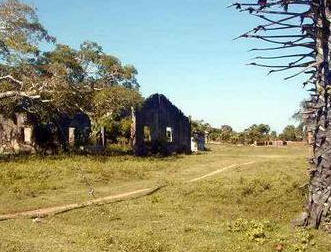|

ஓ....எங்கள் குரல் கேட்கிறதா ?
|
|
10th Anniversary of Kumarapuram massacre 11 February
2006 [Tamilnet]
People of Kumarapuram, a village in Killiveddy
area, Saturday observed the 10th death anniversary of twenty
four Tamil civilians, including children massacred by a group of
soldiers of the Sri Lanka Army ( SLA ) on 11th February 1996.
Thirty Tamil villagers were seriously injured in the incident.
Kumarapuram, which lies about 32 km south of Trincomalee town by
sea, comes under the administrative limit of the Muttur
Divisional Secretariat.
Photographs of twenty sixty victims were kept in the building of
the Kumarapuram Rural Development Society (RDS) Saturday
evening. Villagers garlanded the photographs and lit the flame
of sacrifice.
Special religious observances and prayers were held in
Kumarapuram Krishnan Temple in memory of the victims. Thereafter
a public meeting was held in the Kumarapuram RDS hall with its
president Mr.S.Jesuthasan in the chair, sources said.
A group of SLA soldiers ran berserk on the evening of 11th
February 1996, at about 5 p.m., on receipt of information that
two SLA soldiers were found dead with gunshot injuries at the
58th milepost junction on the Killiveddy-Muttur road, which
leads to the Kumarapuram village, located half a mile from the
scene.
The soldiers started killing civilians and beat many of the
villagers injuring several seriously.
Two Tamil girls were gang-raped by several security personnel
and later killed.
10 men and women, and 14 children were killed at night. The
breakdown by age group of those massacred by the SLA is as
follows: 3 infants below age 5, 3 children aged 5-10, 8 youths
aged 11-20, 6 persons aged 21-30, 2 persons 31-40 and 2 persons
above 50, sources said.
Of the twenty soldiers arrested by the Police immediately after
the massacre the Attorney General has indicted nine with the
murder of 24 Tamil civilians. The case against the accused
soldiers is still pending in the Trincomalee High Court
awaiting trial.
Meanwhile all material evidence, including weapons allegedly
used in the massacre, were destroyed when the office of the
Government Analyst in Colombo was gutted by fire last year,
legal sources said. |
| 09.11.04 Kumarapuram
massacre case inquiry fixed
|
| 11.02.04 Kumarapuram
massacre victims remembered
|
| 05.11.98 Kumarapuram
case goes to high court
|
| 31.07.98 Horrors
of Kumarapuram told in Court
|
| 09.06.98 Permanent
Magistrate to expedite Kumarapuram hearings
|
| 18.05.98 Kumarapuram
trial stalls again
|
|
|
|
|
On Sunday 11 February 1996, Sri Lankan armed forces arrived in army
trucks at the Tamil village of Kumarapuram in the Kiliveddi area of the
Trincomalee district. Soldiers broke open the windows of houses and fired at
those inside. The initial death toll of Tamils who were murdered at
Kumarapuram on that fateful day was 24. They were killed because they were
Tamils.They were:
1. Subiah Savirajah male age 76
2. Kinnan Kovinthan male age 72
3. Sivakkolunthu Sinnadurai male age 56
4. Vadivelu Nadarajah
male age 22
5. Sundaralingam Luxmy female age 35
6. Arunasalam
Kamaladevy female age 35
7. Alahuthurai Parames female age 30
8. Subramaniam Pakkiyam female age 30
9. Arumaithurai Vallipillai
female age 28
10. Selladurai Pakkiyam female age 26
11. Anandan Annamah female age
26
12. Thurairajah Karunakaran young boy age 15
13.
Arumaidurai Santhyaluxmy young girl age 15
14. Kanakarajah Subashinirajah young boy age 15
15.
Vinayakamoorthy Suthaharan young boy age 14
16. Ramajeyam
Kamaleswari young girl age 13
17. Thangavel Kala young girl age 12
18. Shanmuganathan Nizandan young boy age 11
19. Sundaralingam
Pirabaharan young boy age 11
20. Amirthalingam Rasanighandi young
girl age 10
21. Theepan Patiny young girl age 9
22.
Sivapakiyam Thiraiyampan infant girl age 6
23. Pakkkiyarajah
Vasanthini infant girl age 6
24. Sundaralingam Subasini infant girl
age 3
Amnesty International issued an Urgent Action appeal on 13 February
1996:
"In the largest incident of its kind since fighting between the
Sri Lankan army and the Liberation Tigers of Tamil Eelam (LTTE) resumed
in April 1995, at least 24 civilians are reported to have been
extrajudicially executed by members of the (Sri Lanka) army on 11
February 1996...
According to survivors, a group of soldiers from 58th Mile Post army
camp, possibly accompanied by others from Dehiwatte and Kiliveddy as
well as home guards from Dehiwatte, killed 24 villagers at Kumarapuram,
Kiliveddy, Trincomalee district, between 5.30pm and 8pm. Two soldiers
had been killed by the LTTE when their patrol had been ambushed at
around 4pm about one mile north of Kiliveddy.
Several of the 25 people wounded in the same incident, who are
currently receiving treatment at Trincomalee Base Hospital told human
rights workers how soldiers broke open doors and windows of houses and
fired at those inside. One of the women, Arumathurai Thanalakshmi was
reportedly dragged from a boutique in the village and taken to the milk
collection centre where she was raped before being shot. One of the
other women killed was pregnant.
On 13 February, members of the military police were reportedly taking
statements from the injured receiving treatment at Trincomalee Base
Hospital. A magisterial inquiry has been held and the bodies were handed
over to the relatives later in the day. They are reportedly due to be
buried in a mass grave on 14 February.
Soldiers from the 58th Mile Post army camp have reportedly been
transferred out of the area. To Amnesty International's knowledge,
none of them have been arrested. Survivors claim they could identify
some of the attackers. They say that five or six soldiers in
particular went around killing people. Others stood guard.
Amnesty International is urging that a full impartial investigation by a
civilian authority be immediately established to avoid crucial evidence
being lost.
Since the resumption in April 1995 of armed conflict between members
of the security forces and the LTTE in the northeast of the country,
there have been continuing reports of extrajudicial executions,
'disappearances', torture and arbitrary arrests, although the number of
such violations have to date been on a more limited scale than in
previous years.
Throughout 1995, Amnesty International recorded 55 cases of
'disappearance' and approximately 40 extrajudicial executions.
Earlier, Amnesty International appealed to President Chandrika
Bandaranaike Kumaratunga for a full and impartial investigation into a
number of incidents of alleged extrajudicial executions reported from
the northeast during May 1995, including from Trincomalee...
In mid-January 1996, Amnesty International wrote to the President and
to the Minister of Justice and Constitutional Affairs asking to be
informed of the outcome of the investigations and any action
subsequently taken to bring to justice those allegedly responsible. To
date, no responses have been received.."
The University Teachers for Human Rights (JB), no
supporter of the Liberation Tigers, reported on 16 February
1996:
"Between 5.30 and 7.30 PM on Sunday February 11th, armed men in military
uniform ran amok in the village of Kumarapuram, Killivetti, killing 24
(Tamil) civilians and injuring may more. Among those killed were seven
children under the age of 12, the youngest being 3 years old. Some young
women were raped, including one who was raped and killed. The death toll
would have been very much higher had not the people run out and sought
shelter in fields and a grave yard.The incident followed the killing of
two army personnel by the LTTE.
Mr.Thangathurai, MP for Trincomalee, who visited
Kilevetti, his own village, confirmed that the Sri Lankan army
was responsible for the massacre. According to the people a
large number of troops were involved. Apart from those
responsible for the outrage, many troops were on guard in the
surrounding area. They said that they could identify several of
the perpetrators. Several of the troops were from the camp about
the 57th mile post nearer Kilivetti. Some said that troops had
also been brought from other camps such as Dehiwatte in the
Allai scheme.
Troops had prevented the injured from being taken away for
medical treatment until 9.30 the following morning. They
relented only when they heard that Brigadier Paramu Kulatunge of
Trincomalee and Wimal Gunatilleke, DIG/ Police, were coming into
that area. The latter had picked up several empty cartridge
cases. An unexploded grenade that had been thrown into a house
with 12 inhabitants was also picked up...
...People moreover suspect that the degree of organisation
in the massacre could not have come about without complicity
from a higher level in the local area. The act follows
previous acts of indiscipline that have gone unchecked. Towards
the end of last year several civilians in Mallikaitivu were
badly assaulted by the army.
The matter had not been pressed after the Colonel in charge
of the area gave an assurance that such would not be repeated.
Another incident is the murder of two Perinparajahs. One
Perinparajah, a socially active person in that area, used to
pass on information to concerned persons in Trincomalee about
acts of indiscipline by the armed forces. A different
Perinparajah was killed, allegedly by the armed forces, who then
discovered their mistake. The Perinparajah sought after was
according to the people detained by the army at Mallikaitivu.
His body was later found in the locality."
Tamil
Net reported 8 years later:
Kumarapuram massacre victims remembered
[TamilNet, February 11, 2004 16:43 GMT]
The
seventh death anniversary of twenty-four Tamil civilians, including fourteen
children, who were massacred by a group of soldiers of the Sri Lanka Army in
Kumarapuram, in the Muttur division of the Trincomalee district, on February
11, 1996, was held Wednesday. In the 1996 massacre, another thirty Tamil
civilians were seriously wounded, human rights sources said.
Kumarapuram, a hamlet in the Kiliveddy area, which lies
about 32 km south of
Trincomalee town, comes under the administrative limit of the
Muttur Divisional Secretariat.
On the evening of 11th February 1996, at about 5 p.m., two
SLA soldiers were found dead with gunshot injuries at the 58th milepost
junction on the Kiliveddy-Muttur road, which leads to the Kumarapuram
village, located half a mile from the scene.

Kumarapuram village.
|
On receipt of information about this incident, a group of
SLA soldiers entered Kumarapuram, firing at random. Thereafter soldiers
ordered all civilians to come out of their dwellings and lined them up for
questioning. Then soldiers started mercilessly beating them irrespective of
their gender and age. Two Tamil girls were gang-raped by several security
personnel and later killed. On the spot, 12 males, 13 females and 13 small
children were killed at night, sources said.
The next day, February 12,1996, volunteers hearing of the
massacre rushed to the village and found 24 bodies, which were later brought
to the Muttur hospital where the inquests were held. On the Magistrate’s
order, bodies were buried with the assistance of non-governmental
organizations, sources said.

58th junction at Kumarapuram village |
Of the injured, 4 were taken to the Serunuwara
hospital and the remaining 26 were taken to the Trincomalee hospital for
emergency treatment.
Relatives of those killed in the massacre are still
struggling to lead normal lives without a permanent income and necessary
assistance from the authorities concerned, civil sources said.
The breakdown by age group of those massacred by the SLA is
as follows: 3 infants below age 5, 3 children aged 5-10, 8 children aged
11-20, 6 persons aged 21-30, 2 persons 31-40 and 2 persons above 50.
A group of twenty soldiers was arrested by the Police
immediately after the massacre but only nine of them had been indicted by
the Attorney General with the murder of 24 Tamil civilians. The case against
the accused soldiers is still pending in the Eastern High Court awaiting
trial, legal sources said.

Kumarapuram village buildings destroyed
by war
see also Extra
judicial killings of Tamils at the Jeyanthipuram camp
|
|

 INDICTMENT
AGAINST SRI LANKA
INDICTMENT
AGAINST SRI LANKA